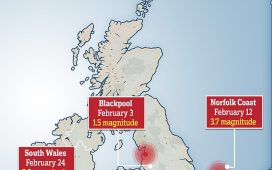[ad_1]

Thousands of planets could be orbiting around black holes just like we orbit the Sun, according to scientists.
Researchers have long thought that planets are formed from pieces of fluffy dust that settle in a disc around a young star. Those protoplanetary discs then form into planets, like our own Earth.
But new research suggests that it might be possible for them to form not around their own sun but instead around a black hole. They might come into existence in far more extreme environments, new work suggests, and a black hole could be home to thousands of planets.
“With the right conditions, planets could be formed even in harsh environments, such as around a black hole,” says Keiichi Wada, a professor at Kagoshima University in Japan.
Rather than exploring the normal protoplanetary discs, researchers looked at heavy discs around supermassive black holes that sit in the heart of galaxies. Those discs can be incredibly vast, and so could the planetary system that grows out of them.
1/10
The eye of Hurricane Dorian as captured by Nasa astronaut Nick Hague from onboard the International Space Station (ISS) on 3 September
Nasa/EPA
2/10
The River Nile and its delta captured at night from the ISS on 2 September
Nasa
3/10
The galaxy Messier 81, located in the northern constellation of Ursa Major, as seen by Nasa’s Spitzer Space Telescope
Nasa/JPL-Caltech
4/10
The flight path Soyuz MS-15 spacecraft is seen in this long exposure photograph as it launches from the Baikonur Cosmodrome in Kazakhstan on 25 September
Nasa/Bill Ingalls
5/10
Danielson Crater, an impact crater in the Arabia region of Mars, as captured by Nasa’s Mars Reconnaissance Orbiter spacecraft
Nasa/JPL-Caltech
6/10
A team rehearses landing and crew extraction from Boeing’s CST-100 Starliner, which will be used to carry humans to the International Space Station at the White Sands Missile Range outside Las Cruces, New Mexico
Nasa/Bill Ingalls
7/10
Bound for the International Space Station, the Soyuz MS-15 spacecraft launches from the Baikonur Cosmodrome in Kazakhstan on 25 September
Nasa/Bill Ingalls
8/10
Hurricane Dorian as seen from the ISS on 2 September
Nasa
9/10
A string of tropical cyclones streams across Earth’s northern hemisphere in this picture taken from the ISS on 4 September
Nasa
10/10
The city of New York as seen from the ISS on 11 September
Nasa
1/10
The eye of Hurricane Dorian as captured by Nasa astronaut Nick Hague from onboard the International Space Station (ISS) on 3 September
Nasa/EPA
2/10
The River Nile and its delta captured at night from the ISS on 2 September
Nasa
3/10
The galaxy Messier 81, located in the northern constellation of Ursa Major, as seen by Nasa’s Spitzer Space Telescope
Nasa/JPL-Caltech
4/10
The flight path Soyuz MS-15 spacecraft is seen in this long exposure photograph as it launches from the Baikonur Cosmodrome in Kazakhstan on 25 September
Nasa/Bill Ingalls
5/10
Danielson Crater, an impact crater in the Arabia region of Mars, as captured by Nasa’s Mars Reconnaissance Orbiter spacecraft
Nasa/JPL-Caltech
6/10
A team rehearses landing and crew extraction from Boeing’s CST-100 Starliner, which will be used to carry humans to the International Space Station at the White Sands Missile Range outside Las Cruces, New Mexico
Nasa/Bill Ingalls
7/10
Bound for the International Space Station, the Soyuz MS-15 spacecraft launches from the Baikonur Cosmodrome in Kazakhstan on 25 September
Nasa/Bill Ingalls
8/10
Hurricane Dorian as seen from the ISS on 2 September
Nasa
9/10
A string of tropical cyclones streams across Earth’s northern hemisphere in this picture taken from the ISS on 4 September
Nasa
10/10
The city of New York as seen from the ISS on 11 September
Nasa
“Our calculations show that tens of thousands of planets with 10 times the mass of the Earth could be formed around 10 light-years from a black hole,” said Eiichiro Kokubo, a professor at the National Astronomical Observatory of Japan who studies planet formation, in a statement. “Around black holes there might exist planetary systems of astonishing scale.”
Just one of the discs around a supermassive black hole can have as much as 100,000 times the mass of the Sun, in the form of dust, the researchers suggest. That is a billion times the mass of a protoplanetary disc.
That material could eventually form into planets, the researchers found, over the course of hundreds of millions of years.
There is no way of detecting such planetary systems around a black hole, and so no way to know for sure whether planets of this kind have yet formed.
A paper examining the possibilities, titled ‘Planet Formation around Super Massive Black Holes in the Active Galactic Nuclei’, is being published in the Astrophysical Journal. A version of it can be read online.
Social media is an increasingly important battle ground in elections – and home to many questionable claims pumped out by all sides. If social media sites won’t investigate the truth of divisive advertising, we will. Please send any political Facebook advertising you receive to digitaldemocracy@independent.co.uk, and we will catalogue and investigate it. Read more here.
[ad_2]
READ SOURCE





